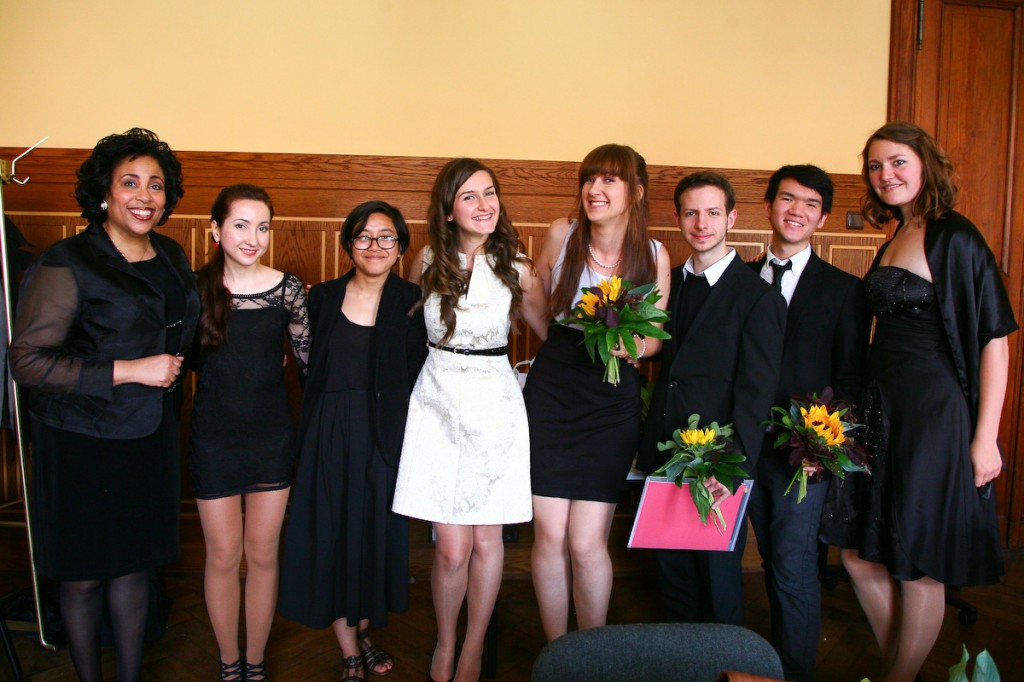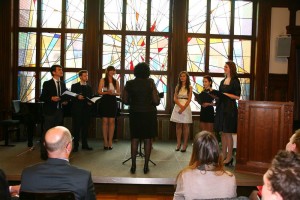
During the preparation for the final choir performance at this year’s graduation ceremony, the harmoniously-intertwined voices of the ECLA of Bard choir were repeatedly—each time with the addition of a new musical ‘flavour’ and spirit—singing this beautiful verse from the part-song Orpheus, with his lute. Based on the poem of William Shakespeare, the musical piece, composed by George Macfarren, manages to convey the sumptuous power of the art of music. Capable to make “trees and mountaintops that freeze bow” upon hearing his mesmerizing playing, Orpheus is the one to impersonate the enigmatic power of this art. As the possessor of a soprano voice in the harmonic mix of our group, I was incredibly thrilled to participate in the ‘music-making’ experience, through which, by achieving a congenial blend of tones and melody lines, our ensemble, together with its director Yvonne Frazier, reached the utmost expression both of our shared love for music and of our hard work on enacting its intricate power.
While it would not be truthful to claim this as being my first singing experience, only as a choir member at ECLA of Bard did I truly feel the seed of my love for music grow through the palpable trail of my vocal improvement. This passion was further enhanced by the prospect of finding myself amongst some of the most enthusiastic lovers of music I have ever met, all joined under the skilled direction of an opera singer and a dedicated vocal instructor. Since my first year as a BA student, the weekly evening choir rehearsals, just as the private vocal sessions, have painted the grey autumn and winter days of Berlin in a great array of vivid colours, while during the sunnier seasons, as amusing as it may appear, even the birds, living in the garden behind the ‘Music room’, seem to be eager to join us and have their share in musicianship by adding to our general disposition towards singing. Having nature on our side and music as ‘muse’, the ‘deciphering’ of ostensibly complicated musical notations becomes a melodious game, and, rather than being a hindrance, serves as a starting point to our further immersion into the musical realm of dynamics and affective response. But before we delve into the technical part of performing and the subsequent process of harmonious heart-felt ‘music-making’, a range of quite interesting preparatory exercises, contrived and compiled by our choir director, shapes the imaginary threshold from the ordinary world to that of music, and transfers us to this latter dimension.

The exercises––a mixture of gymnastics, meditation, and vocal ‘warm-up’––have proved to be extremely helpful in reaching the balance between the amount of bodily exertion and that of mental concentration, so necessary for the confident introduction to singing. This time I can affirm without hesitation that the practice of such exercises has been previously unknown to me, and, I should mention, was quite a pleasant novelty upon joining the university choir. From anchoring our minds onto positive thoughts to imaginarily conceiving an energy exchange between “the earth” and “the heavens” through our own bodily and spiritual being, we manage to achieve that individual placidity of mind. Immediately afterwards, in order to sense a joint idea of calmness and trust between us, we advance with the practice of ‘holding-hands and leaning-backwards’ exercises, among others, which fulfill the initial step towards an exciting choir rehearsal. Next in turn are the self-confidence-boosting and diction-improving drills, after which we all feel like ‘Kings and Queens of Potsdam’, for “I am the Queen” for the female and “I am the King” for the male voices are the usual humourous phrases echoing throughout the ‘Music room’. Amusing enough during rehearsals, these phrases half-jokingly and half-seriously define our accompanying musings before and during our performances. Still, since we cannot all be kings and queens of Potsdam, after we get our usual dose of self-confidence, we proceed with vocal ‘warm-up’ exercises, which prepare our voices for greater pitch-leaps than speaking normally requires.
Shortly after the ‘warm-up’, we are joined by the rehearsal pianist, who, although generally not a vocally-engaged choir member, plays an especially important role for our musical collective. The pianist, usually an ECLA of Bard student, aids us in learning our melody lines when we are introduced to a new musical piece, helps us maintain our proper pitches while singing, and also provides accompaniment for the soloists. Since the ECLA of Bard choir consists of amateur singers, it is central to our ‘music-making’ experience that we receive consistent supporting instrumental sound to direct us to the exact note locations. Yet, apart from providing us with technical assistance, the accompanist fills our compositions with that crucial lively spark, which weaves the sheer human voices together with the beautiful steady sound of the musical instrument. I have always thought of this combination as a certain ‘duet’––an inextricable duet of human voices and one of the most graceful human-made instruments.
Needless to say, our musical inspiration never withers within the walls of the ‘Music room’. Quite on the contrary: we often find ourselves floating in this magical world of reverberating melodies long after our evening rehearsals. Walking back to our dormitories, some of us still hum the tunes to ourselves, though at times the enthusiasm about singing in harmony again prevails, and we are swept back by the waves of music before we even realize it. It may even happen that, hearing this cheerful bunch singing along the streets of the neighbourhood, some strangers make a slight attempt at joining us. After all, the art we create is meant to be shared with the audience, to inspire those who hear us, and construct a close and candid interaction between the performers and the audience through the medium of music. Much looking forward to my following years as a BA student at ECLA of Bard, and particularly as a university choir member, I relish the thought of further ‘music-making’ experiences, rehearsals, performances, re-uniting with our choir director and choir members, meeting new music lovers, and merely savouring the ‘flavours’ music has to offer.
